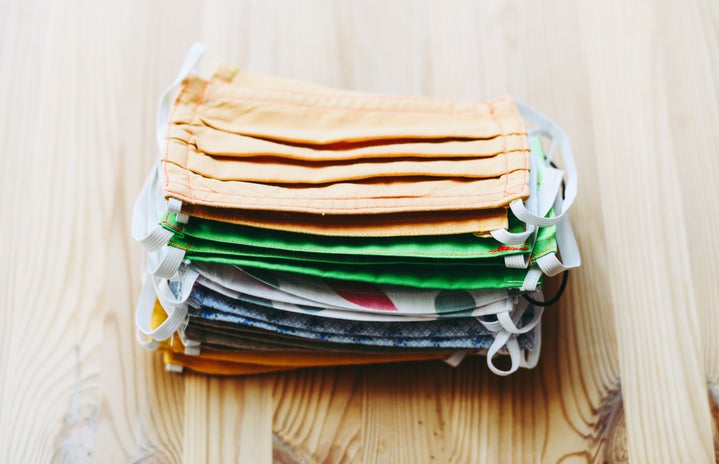If your timelines and Instagram feeds are anything like mine, you’ve been seeing the slew of “this time last year was the last day of normalcy” posts with pictures of maskless gatherings, outfits of the day, and bathroom mirror selfies at school. This has been affecting me a lot and making me remember my last “normal” day of life. I was going to classes, hanging out with my suitemates in our dorm, getting lunch with friends, and looking forward to the first day of spring break. In the middle of class, I got the news that New York Governor Cuomo was shutting down SUNY campuses in response to the COVID-19 pandemic. That was the moment my world – and everyone else’s – turned upside down.
I could make an article about how my life changed because of the COVID-19 pandemic, but I didn’t want to focus on that. As rough as my life has been within the past year, so many folks have had it worse. So instead, I want to look back over this past year and talk about what we were forced to see about our society and the way it’s run because of COVID-19.

Public Health
This year, I learned how many people don’t trust health officials. This article by Nichole Caroll of USA Today gives a brief overview of several of the reasons why Americans don’t believe that COVID-19 is as big of an issue that public health officials and the media are painting it to be. Two of the five arguments made by folks who don’t get the COVID-19 “hype” are based on doubt of the accuracy of the data recorded on COVID-19 positives and COVID-related deaths, and one more is based on the belief that the data is not as bad as it seems.
Beyond believing the severity of the COVID-19 pandemic, there is also a lot of distrust in the available COVID-19 vaccines, not just among anti-vaxxers (folks who are against vaccination for one reason or another). In an Associated Press (AP) poll conducted between January 28 and February 1, 2021, about one third of respondents said they either “definitely” or “probably” wouldn’t get a COVID-19 vaccine. Why? One of the largest reasons for vaccine hesitancy in the context of the COVID-19 vaccine is the speed of which it was created. This video from Five Thirty Eight, an offshoot of ABC News, explains this. The video counters this commonly cited reason for hesitancy with the fact that the speed in which it was created was a result of drastic scientific advances and the high number of research labs and companies that were taking on the task of developing a COVID-19 vaccine.
I also want to address in this section the history behind the mistrust of public health officials in Black, Indigenous, and other communities of color in America. According to the previously cited AP poll, Black Americans were statistically more likely to oppose taking the COVID-19 vaccine, but according to this article by Zakiya Whatley and Titilayo Shodiya of Scientific American, Black, Hispanic, and Indiginous communities are at a higher risk of infection and are “overrepresented in COVID-19 deaths.” While this may seem odd, Shodiya and Whatley go on to discuss scientific and medical racism, something that has plagued these communities of Americans for centuries. Two examples are the era of involuntary sterilization that targeted women of color and women of lower socioeconomic status (more information in this University of Michigan article by Dr. Alexandra Stern) and the 1932 Tuskegee Syphilis Study that targeted Black men and intentionally infected them with syphilis without informing them of this, and without providing treatment or information about the disease (more information in this Time Magazine article by Olivia B. Waxman). Public health and the government have failed people of color time and time again, and so it makes complete sense to see their hesitancy to trust a vaccine pushed so heavily by the government.

Politics
Something that baffled me to no end this past year was how the COVID-19 pandemic and America’s reaction to it somehow became a partisan issue. Most of what I knew about the partisanship nature of COVID-19 came from personal experience, but I found a wonderful academic article written by John Sides, Chris Tausanovitch, and Lynn Vavreck that explained everything much better than I could have. According to them, at the beginning of 2020, concern about COVID-19 and support for local and state COVID restrictions was fairly bipartisan. However, partisanship of opinions on the severity of COVID-19 and the necessity of COVID restrictions developed over time, with Republicans being less likely to express concerns about the virus and more likely to call for reduced restrictions. Partisanship on state and local levels are even more drastic than what we see on a national level, with Republican-led states such as Texas and Mississippi completely lifting their mask mandates and rolling back other COVID restrictions. Overall, Sides, Tausanovitch and Vavreck cite conflicting messages from party leaders as the cause for such intense polarization regarding COVID-19.

Morality
As a grocery store employee, specifically a cashier, I see a general lack of human decency on a daily basis. It’s not news that people tend to treat retail employees like cashiers, fast food workers, and wait staff at restaurants poorly. But with the rise of COVID-19 in the past year, I’ve seen a new side of the human condition: the general lack of concern for others that many people have. With common arguments against the severity of COVID-19 including that the death rate is ‘so low,’ ‘only old people and immunocompromised people are dying of COVID’, and that COVID is ‘no worse’ than the flu, it’s easy to lose faith in humanity. If you don’t have a high risk of death from COVID, you should still care about others in your community that might. Even if you aren’t afraid to get COVID, you still have the ability to spread it to people who are.
America has a culture of individualism. But individualism doesn’t work out very well when you’re working to get a country out of the depths of a deadly pandemic. COVID-19 has allowed me to see more clearly the ills of our society and the flaws of our systems. Not everyone has taken this pandemic as an opportunity to reflect on these social issues, though, and I don’t think we as a country will be able to climb out of this pandemic until a majority of us do.


